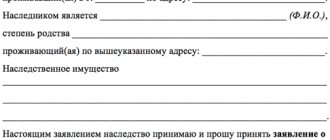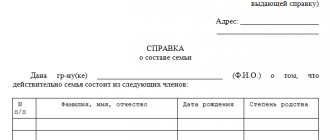4
There are many nuances in the issue of inheritance. This takes into account the order of inheritance, the composition of applicants and the method of entering into property rights. One of the key points is the degree of relationship. It is not taken into account only if there is a will. The first priority applicants are close relatives of the deceased subject. However, not everyone knows whether guardians are included in this category of legal successors. Let's consider whether the guardian has the right to inherit the ward after his death.
Is the guardian of a minor
According to Federal Law No. 48-FZ dated April 24, 2008, guardianship means the form of the device:
- citizens under the age of 14;
- persons declared legally incompetent.
Guardian information:
- appointed by the guardianship and trusteeship authority;
- may be either relatives or strangers to the ward;
- are the legal representatives of the above citizens and are authorized to perform any legally significant actions in their interests;
- transactions with real estate and other property of the ward are carried out by guardians only with the consent of the guardianship authority.
The responsibilities of guardians of minors include:
- caring for the health of the ward;
- protection of his property interests;
- education of minors;
- providing them with education.
Guardianship is appointed over a minor in the event of the death of parents, deprivation of their rights, unknown absence, personal removal from child care, or imprisonment.
Important! A minor child retains his first name, surname, and patronymic.
The state pays monthly funds to the guardian of a minor for the maintenance of the ward citizen. Control over the use of targeted public funds is exercised by the guardianship authority.
heir of the 1st stage
The guardian of a minor may be a relative or a stranger, including foreign citizens. Restrictions on the appointment of guardians are described in Article 146 of the RF IC.
The procedure for selecting a suitable candidate is enshrined in Government Decree No. 423. Preferential right is given to the child’s relatives in order to preserve blood ties.
Expert opinion
Stanislav Evseev
Lawyer. Experience 12 years. Specialization: civil, family, inheritance law.
Since a minor citizen cannot draw up a will, the guardian cannot become a legal successor by will.
The recipients of the 1st stage are the children, parents, and spouses of the deceased. A minor is placed under guardianship because his mother and father cannot take care of him on their own; he simply does not have other first-degree relatives. Therefore, the guardian of a minor cannot be the primary claimant to the inheritance.
However, if the parents of the ward are deprived of parental rights, then they are unworthy successors. If the legal representative is his brother or sister, then they can become heirs by law.
heir to the apartment
The child's guardian can claim his apartment only as an heir by law. If guardianship is assigned to a brother or nephew, then in the absence of other recipients, the property will pass to the legal representative.
Ward and inheritance: you cannot refuse to join
Anton Zharov, lawyer, specialist in family and juvenile (children) law, head of the “Team of Lawyer Zharov”
Entering into an inheritance inherited by a child under guardianship is a common headache for a guardian or trustee. On the one hand, one fourth of the apartments in the village of Zarechnoye, where a bus goes once a day from the regional center, is not a fact that it is a necessary acquisition, on the other hand, who would refuse an apartment, say, in the regional center? In any case, acceptance (or non-acceptance) of an inheritance is a subject of discussion between the guardian and the guardianship authority, and if the ward is already 14 years old, then with him.
First, you need to understand that neither the guardian nor the trustee has an automatic obligation to accept an inheritance.
Accepting an inheritance is a transaction. It may be one-sided, but it’s a deal. This means that all rules established by law for transactions of the ward must apply to this action. Along with this, Article 37 of the Civil Code of the Russian Federation does not contain such a type of transaction as “acceptance of an inheritance”; the acceptance of an inheritance does not fit the rest, generally named, types of transactions. That is, the acceptance of an inheritance in itself (as opposed to, for example, the sale of real estate) occurs without the mandatory prior consent of the guardianship and trusteeship authority.
It should be noted that accepting an inheritance is an action. And failure to accept an inheritance (that is, failure to take any actions aimed at accepting it) is not an action. Therefore, strictly speaking, if you, having received information about the death, for example, of the mother of a ward and the opening of an inheritance, do nothing, you do not violate anything.
There is an opinion that the guardianship authority may oblige you to accept the inheritance by issuing a binding instruction on the disposal of the ward’s property (Part 2 of Article 19 of the Federal Law “On Guardianship and Trusteeship”). Such an instruction must be written and, accordingly, signed by the head of the guardianship and trusteeship body. “Conversations” of any kind do not count in any case. However, it must be taken into account that the guardianship authority has the right to give instructions on the disposal of the ward’s property. But before entering into inheritance, this property cannot be considered to already belong to the heir.
In other words, it is impossible to force you to accept the inheritance in an administrative-command manner .
In my opinion, if the guardian does not apply to accept the inheritance, the only thing the guardianship authority can do is to file a lawsuit to recognize the ward’s property rights by inheritance.
Second . If the child is already 14 years old, it must be taken into account that all transactions, including the transaction of accepting an inheritance, are made by him himself, and the trustee (and in some cases, the guardianship authority) only gives permission for this transaction. Therefore, if a teenager for some reason does not want to accept the inheritance, he cannot be forced. He simply does NOT need to sign.
Third . Acceptance of an inheritance is not always a transaction to the benefit of the ward, and this means that the guardian does not always have the right to accept it (and the trustee has the right to consent to its acceptance).
Acceptance of an inheritance in itself is not only a statement that the heir is ready to accept some property, but also a signature that the heir assumes the debts of the testator , and, in some cases, this is possible, other obligations associated with the inheritance . The game is not always worth the trouble.
Let me give you an example. In the regional center of the Yaroslavl region, an inheritance opened after the death of K. The heirs turned out to be her mother and two minor children. The estate includes 1/6 of a two-room apartment. Thus, one of the children under guardianship will inherit 1/18 of the provincial “kopeck piece”. At the same time, the mother’s debts on loans and part of the debts for rent amount to more than a million rubles, which exceeds not only the cost of the share, but also the cost of the entire apartment. Under such circumstances, we recommended that the guardian refrain from accepting the inheritance, despite active pressure from the guardianship authority.
Thus, when accepting an inheritance, the ward will have to pay off part of the testator’s debts. Within the value of the inheritance received, of course, but where will he get these several hundred thousand rubles? From the guardian's pocket? From your own funds allocated for its maintenance? For what? Of course, it’s easier not to accept the inheritance at all.
The guardian has the right to make (and the trustee to give consent) only such transactions that lead to the benefit of the ward. Is it really beneficial to accept as an inheritance an illiquid piece of an apartment, burdened with debts and located far from the ward’s place of residence? After all, such property will have to be maintained, and the funds for this will be taken from the ward himself; in any case, these are not the expenses of the guardian.
Another important point . Having entered into inheritance rights to any housing, your ward will inevitably face the problem of obtaining housing upon reaching 18 years of age. The first thing the officials will offer him is to move into the “share” that he so recklessly received when, for example, he was seven years old. And, at best, it will be possible to prove that living on this “share” is impossible, and at worst, the child will lose the right to receive housing from the state. Of course, this argument will not be accepted in any way by the guardianship authority when accepting the inheritance, but by the age of majority this can really become a problem.
Thus, if your ward suddenly has a testator, do not rush into inheritance. It is necessary to evaluate how much this transaction is aimed at the benefit of the ward (taking into account all factors) and only then decide: to accept the inheritance or to refrain from it. The guardianship authority cannot “force” the guardian to accept the inheritance, but can only go to court with a demand to recognize the property rights of the ward. But, as they say, “science doesn’t know this.” And a teenager over 14 years old has the right to decide for himself whether to accept an inheritance or not.
02/06/2018 (updated 06/19/2019)
Is the guardian of the person incapacitated?
Guardianship over adult citizens is appointed if they are declared incompetent by a court decision due to a mental disorder. The guardian does not receive payment for the performance of his duties. In most cases, close relatives (children, spouses) become guardians of adult incapacitated citizens.
If the ward is assigned a disability pension, then the legal representative has the right to receive funds and spend them in the interests of the ward.
Can wards use the assets of their guardians? Yes, but only with their consent. Whereas guardians are prohibited from using the property of their wards for personal interests.
heir of the 1st stage
When assigning guardianship to adult citizens, their relatives (parents, spouses, brothers and sisters) have priority rights. According to the law, the guardian can be the heir of the 1st line.
In this case, a brother or sister can be appointed as a guardian. These persons belong to the heirs of the 2nd stage. Guardians do not have any additional preferences due to their status.
However, there is a reason why close relatives did not become guardians. If the children, spouse and parents refuse to care for the incompetent, they may be recognized as unworthy heirs. In this case, the property will be received by the brothers and sisters.
heir to the apartment
The law does not exclude this possibility. For example, if the guardian is a close relative of the ward (spouse, father).
Heirs of the 2nd line can accept the property of the ward under the will. Provided that the document was drawn up long before the registration of guardianship. Also, succession arises in the absence of 1st line applicants.
Rights of a guardian after the death of the ward
Guardians are not the owners of the property of the citizens under their guardianship. Likewise, wards are not the owners of property that belongs to guardians (Article 17 of Federal Law No. 48-FZ). However, guardians and wards can be co-owners of certain property.
Example. Citizen P. became the guardian of her younger brother after the death of her parents. Although the girl was only 20 years old, there were no other relatives who could obtain guardianship. Their grandmother was 80 years old and seriously ill. After the death of her grandmother, the girl and brother became the heirs of her apartment. Since the testator did not allocate a share, the living space was divided equally, ½ share to each of the grandchildren.
Additionally, the guardian can count on reimbursement of expenses he incurred in connection with the funeral of the ward or protection of the inheritance (Article 1174 of the Civil Code of the Russian Federation). The maximum amount of compensation for the burial of a citizen is 100,000 rubles .
The money is reimbursed from the opened inheritance. Funds can be withdrawn from the bank account ahead of schedule. For example, if the testator opened an account and/or placed a deposit during his lifetime. Money is issued based on a notary's decree. However, the applicant for compensation must first contact the guardianship authority.
Basic Concepts
The current legislation already provides for various situations; all legal norms are described in the legal literature. But in order to understand the intricacies and answer the question of whether guardians can enter into inheritance, you need to be able to use special terms and concepts. Legislatures clearly define whether a will can be rewritten or made in favor of a guardian.
There is also an option when the expression of will was not formalized. In this case, we are talking about accepting the inheritance according to the law. If more applicants are identified, the problems will have to be resolved through the courts. The rights of guardians and wards arise from their legal status. Federal Law FZ-43 (second article) provides that a dependent is a citizen who, even at the age of majority, for objective reasons, is prohibited from:
- to make deals;
- sign legal documents;
- manage your own property.
USEFUL INFORMATION: Statement of claim for the collection of child support for a mother without a divorce when living together; is it possible to claim alimony?
The prohibition arises from incapacity. A trustee (not necessarily a relative of the ward) is a person who takes responsibility for the dependent and decides all legal aspects for him. And when the latter passes away, disputes most often arise between the applicants. The subject of the dispute is inherited property.
Also included in the number of wards are minor children under 14 years of age. If parents die, the guardian becomes a grandfather, grandmother, aunt, stepfather, brother, sister, etc. The main requirement is the age of majority of the legal successor. There is a special government body that officially confirms the right to guardianship and controls its quality - this is the guardianship and trusteeship service.
Rights of a ward after the death of a guardian
The law classifies a minor or incompetent ward as a dependent of the deceased. Therefore, they enter into inheritance regardless of the method of inheritance.
Possible options:
- Acceptance of inheritance by law occurs in the order of priority. The first to enter into rights are children, parents, and spouses. After them come brothers and sisters, etc. The ward enters into the inheritance together with the inheritor, as a dependent. He is entitled to a share equal to the shares of other recipients.
- You can change the usual order with the help of a will. The heir can assign his property to any person. For example, a business partner, a neighbor in the country, or a nephew. The ward may also be the heir of the guardian under a will.
Even if a citizen wanted to deprive the ward of a share in the inheritance, a limitation is provided - a mandatory share of the inheritance. It is due to young children, disabled parents or dependents of the testator. The ward has the right to ½ share of the property that he would receive by law.
Who is considered a guardian and ward?
Guardianship is established for children aged from birth to 13 years inclusive if their parents are unable or unwilling to care for them. Also, adult citizens who are deprived of legal capacity in court need guardianship. These are individuals who have serious mental disorders and cannot understand the consequences of their actions.
The guardian fully represents the interests of the ward. He carries out transactions on his behalf and accepts inheritance. But rights as a result of his actions arise in the ward.
For example, if a representative enters into an inheritance on behalf of a ward, then the ward acquires ownership of all property.
Guardianship is a form of placement for children aged 14 to 17 years who are left without parental care. And also a way to protect the rights of citizens with limited legal capacity.
The trustee gives the ward consent to conduct transactions, since citizens with limited legal capacity cannot carry them out independently.
Take the survey and a lawyer will share an inheritance action plan in your case for free
You might find it useful:
State duty calculator for inheritance
Samples of inheritance documents
Consultation with a lawyer on inheritance
If there is a will
An administrative document allows you to change the order of inheritance and the composition of applicants for the testator’s property. However, there are some limitations.
A guardian can assume property rights provided that a will was drawn up in his name before the citizen was declared incompetent. Otherwise, the order will be declared invalid in court.
Whereas the guardian is unlimited in his expression of will. He can freely assign his property to the ward. Naturally, the new guardian or adoptive parent will accept the property in the interests of the ward.
A young child does not have the right to write a statement of will on his own. The law does not provide for the possibility of formalizing an expression of will through a representative.
Inheritance of property of a ward
The procedure for entering into inheritance is determined by law.
Algorithm of actions of applicants
| No. | Action | Comments |
| 1 | Preparation of documents | The heirs need to collect papers that confirm their involvement in the deceased subject and his property |
| 2 | Submitting an application to a notary office | You must declare your rights within 6 months. Failure to contact a notary in a timely manner will result in loss of property rights. The papers are submitted to the residential address of the deceased ward. |
| 3 | Obtaining a certificate of inheritance | The document is issued 6 months after the death of the testator. The certificate is issued after payment of the state fee. Its size depends on the degree of relationship between the beneficiary and the deceased citizen. The necessary calculations are made based on the property value report. You can order an assessment 2 weeks before contacting a notary. |
| 4 | Registration of ownership | The basis for registering property with the state is a certificate issued by a notary. Where exactly the heir should apply depends on the type of property being registered. Real estate registration is carried out at the Rosreestr branch. Papers can also be submitted through the MFC. |
After receiving an extract from the Unified State Register of Real Estate, ownership passes to the heir. After which he can sell, donate or bequeath the property to third parties.
Does the guardian have the right to inheritance?
43 Federal law does not provide for the inclusion of guardians among the persons who can claim an inheritance only on the basis of the care shown to the testator, if they are not relatives. The fact that the legally appointed representative of the incapacitated person performed certain functions is not a sufficient reason for the right to obtain ownership of the property.
And paragraph 3 of Art. 37 of the Civil Code completely invalidates transactions concluded between a guardian and a ward, thereby abolishing any rights and claims in relation to the latter’s property. At the same time, practice shows that the law has levers that allow one to enter into an inheritance both under a will and without it.
In what cases is succession by will possible?
The relationship between the guardian and the ward regarding inheritance is ambiguous. If there is a guardian needed to help the testator in solving everyday and legal issues, it means that the person he is caring for is incompetent and does not have the right to draw up a will. But, if at some point he becomes legally capable, it is enough to go to the notary at his place of residence and sign the declaration of will.
To obtain the right to inherit, the guardian must lose this status. Legal capacity presupposes that:
- The court recognized this fact and reflected it in the court ruling.
- The condition occurred upon reaching adulthood.
- The minor got married and began working.
Only after the formation of the listed circumstances does the guardian have the right to enter into an inheritance after the death of the ward. But for this you need to document the expression of will. After the death of the ward, the guardian can use the data and receives the right to the property of the deceased. To do this, you must appear at the same notary office.
Is the guardian a first-degree heir?
The legal procedure for entering into inheritance for a guardian provides more opportunities than for another heir. The decisive factor is status in relation to the first line of succession. However, guardians acquire rights to inheritance only at the moment when they are the spouse of the ward, son (daughter), granddaughter (s), if the father and mother have died. The age of the dependent is a mandatory requirement. Guardians of the second, third, fourth, etc. order enjoy the right to enter into inheritance on the rights of their turn.








